Kissing Books: Where it all began
Every month, Olivia Waite pulls back the covers, revealing the
very best in new and classic romance. We’re extending a hand to
you. Won’t you take it?
Olivia is on break this
month, so we're using this time to re-run one of her early
columns. In fact,
it's her very first from 2017. Enjoy!
Every first Thursday, this column will showcase four new romance releases and one revered classic or foundational influence from years past. All five books will end with a Happily Ever After, or at least a Happy For Now. (HEA and HFN for short — and now you’re in the know.) Many of these romances will be historicals; many will be LGBTQ; many will have a paranormal or SFF setting. Sometimes we’ll have all those things in one book, because I like all those things and romance is generous and full of gifts. Some books will be sugar-sweet with a single delicate kiss at the end; others will be hot enough that just cracking the cover will set off all the smoke alarms in a three-block radius.
No children will be imperilled, no women assaulted simply for shock value. The dogs will always live.
It’s no exaggeration to say I’ve loved this genre all my life. I stole my first romance novel from my mom’s shelf at the age of five – a kinky space opera romp by Johanna Lindsey. Imagine Jupiter Ascending starring Slave Leia and Conan the Barbarian, and you’ll have the general idea. Mom, appalled, took the book away when I was only halfway through. It took me ten pre-internet years to find another copy and get to that happy ending, but I did it. Romance readers: we’re unstoppable.
And I kept going. I read Julie Garwood in high school, Julia Quinn in college, and Jeannie Lin in grad school. I sold my first romance manuscript a year after graduating, watched my publisher go down in flames five years later, and started self-publishing my backlist in between writing longread analyses of individual books. You know, for fun. I have more romances on my shelves than I can possibly ever read, and more ideas for romance novels than I can ever write.
A mystery is at heart about justice, just as a science fiction story is about envisioning the future and fantasy is about imagining worlds profoundly different than the one we inhabit. Romance is the only genre whose formula is specifically and exclusively about people: the characters are strangers at the beginning and lovers at the end.
Romance novels are important because people are important.
And romance novels are at the center of a lot of people’s lives. Last week, on the farther coast, two thousand romance authors and industry professionals gathered for the Romance Writers of America’s annual national conference. This is not a fan event, but a professional one. Authors bought old friends rounds at the bar and swapped marketing tips with editors and self-publishers. They are mostly women, and along with all the craft and business workshops, they talked about feminism, about race and systemic bias in publishing, about disability and queerness and gender and religion. They have a great deal to say about women’s place in history, in literary culture, in the modern world and in the future.
Romance novels are good fun, and romance novels are big business. It’s a fascinating tangle of passion and money and meaning, and I’m so happy to be here to talk about it.
Recent romances:
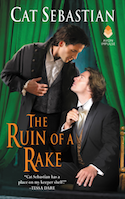
The Ruin of a Rake by Cat Sebastian (Avon Impulse: m/m historical)
Lord Courtenay is appallingly gorgeous, shockingly lewd, and socially outcast. Julian Medlock is upright, prim, and polished within an inch of his life. Each man openly loathes what the other stands for — so it’s a good thing for the romance that they’re both such frauds. This is a story about peeling back layers, about the walls people put up to defend their too-squishy hearts, about taking risks and making mistakes and trying again. Also the best example of sex-scenes-as-character-twist I’ve seen recently. If you like discovering the nurturing side of a Byronic hero, or watching a priggish accountant-type verbally cut someone to ribbons in his lover’s defense, this is your book.
Julian felt about Courtenay’s looks the way radicals thought about money: that it was deeply unfair and problematic for one person to possess such a disproportionate share.
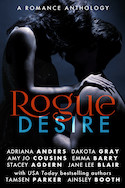
Rogue Desire anthology by Adriana Anders, Dakota Gray, Amy Jo Cousins, Emma Barry, Stacy Agdern, Jane Lee Blair, Ainsley Booth, and Tamsen Parker (self-published: contemporary, various heat levels).
If you’re looking for escapist fluff you won’t find it here — the tone of this resistance-themed anthology is unsubtle, raw, anxious, and fierce by turns. Future historians and critics of romance fiction will make much of the way a certain orange malevolence lurks unnamed in the subtext. At times this book, so viscerally of-the-moment, poked too hard at wounds that are still raw and tender. At other times, though, the sublime gleams through. High points include Jane Lee Blair’s true-hearted pastor hero who cusses with sailor fluency, and Tamsen Parker’s sharp-sweet final story featuring a Jewish heroine whose working title was, no joke, “Hate-Pegging Conservative Josh Lyman.” Anthologies are always useful for testing out new-to-you authors, whether you like your books heavy on the sizzle (Dakota Gray) or populated by policy nerds (Emma Barry, who provided the advance copy. She knows my weaknesses far too well).
There was no excuse not to hold on with both hands when you found love. They’d work the rest out. First, though, they had to get through the sedition.
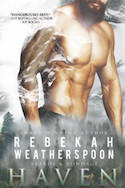
Haven by Rebekah Weatherspoon (self-published: erotic contemporary).
Rebekah Weatherspoon writes some of the best sex scenes around (and now has the Lambda Award to prove it). Her latest is the story of a smart-mouthed Manhattan fashion buyer and a surly, bearded tree of a mountain man: bonded by a shocking tragedy, they try to work out their tangled emotions through dark, beautifully nasty sex. It’s a terrible idea and everyone knows it, including our hero and heroine. This is BDSM romance for the advanced set, by an absolute mistress of the genre — the sex is certainly kinky, but the real danger is in the feelings. This couple’s story is like watching an avalanche in slow-motion: grand, strangely beautiful, and terrifying. I have read more extreme scenarios (Tiffany Reisz, anyone?) but never had my heart in my mouth quite this much. Readers in search of what slinks in the shadowy corners of the heart (and associated organs) will find this memorable and satisfying; those in search of less-intense fare should check out the candy-coated Sugar Baby novella trilogy or the juicy, queer-centric, pulpy fun of the Vampire Sorority Sisters series. (Rebekah created WOCinRomance to promote books written by women of color; I am both a Patreon supporter and a member of the monthly book club.)
“Push back turning you on?” she says as she slips on her bra. “A little bit.” “I mean, I can make today a living hell for you, you just say the word, Master Shep.”
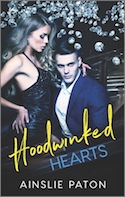
Hoodwinked Hearts by Ainslie Paton (Carina Press: contemporary)
Everything in this heist romance is dialed up to eleven. Imagine a thousand Leverage fanfics piled up high, covered in glitter and set on fire. Hero Cleve Jones is a master burglar and lifelong conman. Heroine Aria Harp is the one person he’s never lied to: his mentor’s rebellious daughter, a shaved-headed, scorpion-tattooed identity thief (!) with a mile-high chip on her shoulder. The story is brief and fiery and rough as a striking match. The prose is hyperbolic and luxurious with occasional sharp shocks of electric truth. At one point there is an extended theft-and-fart-joke scene that does for flatulence what Wodehouse does for hangovers. Ainslie Paton may well be allergic to literary restraint, but let’s not offer to cure her until she’s written a few more books.
Cleve didn’t duck. He said the words Aria warned him not to say, “I love you,” then he stood there like a stone monument to men too smart to know better, so she swung at him and connected with his jaw.
This month’s harlot heroine with a heart of gold
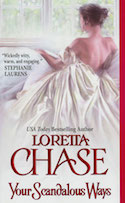
Your Scandalous Ways by Loretta Chase
This was the first Loretta Chase I read and it upended all my thoughts on what heroines could be/do in a Regency romance.
Even if she’s embroiled in some light scandal, the typical Regency heroine is virginal, earnest, and morally above reproach. Francesca Bonnard is none of those things. Not since her titled husband broke her heart, ruined her name, and divorced her by act of Parliament. Now Francesca is a notorious courtesan in Venice, seducing the crowned heads of the Continent and wearing spectacular jewelry and low-cut gowns to the opera five nights a week. Her first POV line is a showstopper: “Penises. Everywhere.”
Due to the scandal of divorce, Francesca is an exile, and she pines for the glitter and social whirl of London lost. It’s as though she’s grieving the loss of the romance-novel story of her first marriage — the ballrooms, the aristocratic suitor, the dazzling courtship. Francesca is an ex-heroine as much as she is an ex-wife.
Nevertheless, at the novel’s end, Francesca is once again wedded, wealthy, titled, and planning parties for the height of the Season. She is, after all, still the heroine of this romance novel. The text never punishes her for her sins or forces her into a humiliating repentance: instead, everything that British society holds against her (manipulating callow young royals, seducing the hot jewel thief next door, refusing to let men boss her around) helps her get to this second, better HEA. She may be a fallen women, but she’s neither broken nor weak.
It’s downright inspiring.